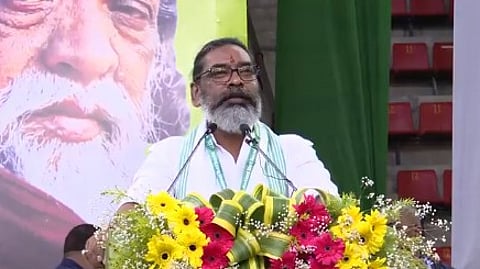

RANCHI: During the 13th General Convention in Ranchi, the Jharkhand Mukti Morcha (JMM) strongly opposed the recently implemented Waqf Amendment Act and reiterated its long-standing demand for a nationwide caste census.
The two-day Central Convention started on Monday, April 14th at Dr. Bhimrao Ambedkar courtyard in Ranchi.
Led by JMM Executive President and Chief Minister Hemant Soren, the party resolved to protect the rights of the poor and tribal society of the state.
Meanwhile, a 108-page organizational report of the party was also tabled during the convention.
Senior party MLA Stephen Marandi presented a comprehensive political proposal that addressed several key issues concerning social justice, minority rights, and employment policy.
Marandi emphasised that JMM supports the conduct of a caste-based census not only within Jharkhand but across the entire country, viewing it as essential for equitable policy-making.
In its proposal, the party also registered opposition to the present framework of delimitation, calling for a more inclusive and representative process.
Regarding the Waqf Amendment Act, Marandi clarified that the party considers the amendment a direct infringement on the rights of minorities and a violation of the secular spirit enshrined in the Constitution.
Expressing opposition against the Waqf Amendment Act, it was said that it is violating the rights of minorities. Land is a state subject, but the Center did not consult the state before the Waqf Amendment, and hence, an atmosphere of terror is being created in the name of religion and caste, they said.
It was also said that the Act should not be implemented in Jharkhand. It was also announced during the convention that JMM will now increase its political activism in some selected seats of Assam, Odisha and West Bengal as well.
There is a plan to contest elections in Assam by organizing the migrants of the state. The proposal also included a demand for granting 27 per cent reservation to Other Backward Classes (OBCs), reflecting the party's commitment to affirmative action.
Marandi further stated that JMM is in favour of implementing the employment policy with 1932 as the cut-off year for determining local status, which has been a point of contention and advocacy in the state.
The proposal also included a demand for 75 per cent reservation for local youth in private sector jobs, aiming to ensure better employment opportunities for residents of the state.
Additionally, the party raised the long-pending issue of officially recognising the Sarna Religion Code in Parliament, a demand significant to tribal communities who follow indigenous faiths.